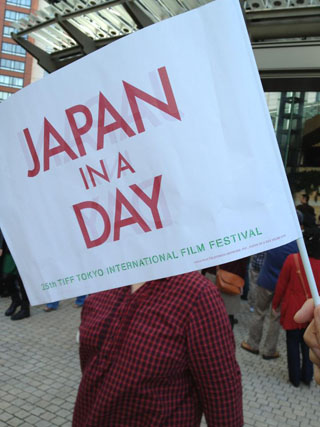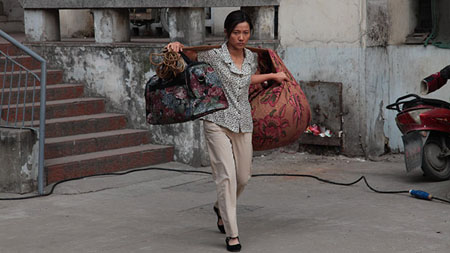“‘The Power of Films, Now!’ is the sunny motto of the 25th Tokyo International Film Festival,” reports the Telegraph‘s Robbie Collin. “That’s a cute slogan, but also a keenly appropriate one: it is hard to imagine a film more powerful or current than this year’s special opening gala. Japan in a Day [Facebook] is a documentary shot by more than 8,000 amateur filmmakers, mainly from Japan, on March 11, 2012: the first anniversary of the Tohoku earthquake and tsunami that devastated the country’s east coast, caused a meltdown at the Fukushima nuclear power plant and killed at least 15,870 people. Two directors, one English, one Japanese, sifted through the submitted footage and from it cut together this hour-and-a-half-long national portrait…. The earlier …In a Day films [Life in a Day, Britain in a Day] were natty exercises in editing and featured more than their fair shares of diverting moments, but this is the first in the series to feel like it carries a significance beyond the fact of its own creation.”
In the Hollywood Reporter, Megan Lehmann notes that the earthquake serves “as a catalyst for a heartfelt but frustratingly inert study of a fracturing relationship” in Since Then: “Returning to the themes of mental illness and estrangement that informed his festival-favorite debut Okaeri, Japanese indie director Makoto Shinozaki here distances the audience through a painstakingly spare use of action and dialogue.”
Also: “A trio of Tokyoites jitterbugs through a series of absurdist set pieces on their way to self-discovery in Kuro, the self-consciously quirky debut feature by Japanese director Daisuke Shimote. Insubstantial but occasionally diverting, it’s a comic drama whose purely physical comedy comes in fits and starts, seemingly independent of the narrative.”
On Saturday, Stephen Cremin reported in Film Biz Asia that China had announced the previous Thursday that it had withdrawn Wang Jing’s Feng Shui from the Competition “because of the current political tensions between China and Japan.” Turns out, the film screened after all, but the Q&A was cancelled at the last moment.
Derek Elley: “Feng Shui could have been just another story of the battle by an uneducated but determined Chinese woman to build a path in life, or another story about the country’s economic and social changes from the mid-’90s to mid-’00s (the film is split into two equal parts). Instead, it’s actually much less cut-and dried—a film in which there are no heroes or villains, where most of the characters are flawed, most of them adapt with typical Chinese practicality, and the leading character still doesn’t quite get the point even at the end…. Hardly known outside China, Wang, now in his mid-40s, has quietly built a small but impressive body of films, often with producer-writer Xie Xiaodong, that are notable for their performances and strong scripts, and they way in which they deal with social issues in a cinematic way (migrant workers in The End of Year [2007], internet abuse in Invisible Killer [2009], pharma power in Vegetate [2010]). Yan [Bingyan], 39, is an actress who spends far too much time in TV dramas than on the big screen, where her relatively few leading roles have always been memorable (Teeth of Love [2006], Full Circle [2012]). Much like South Korea’s Jeon Do-yeon, Yan has a chameleon quality—especially well used in Teeth—that allows her to mutate into a role rather than impose her own image on it, and this, under Wang’s supportive direction, is the main draw of Feng Shui.”
In the Japan Times, Kaori Shoji briefly traces the history of the festival, whose current edition runs through Sunday and features “commemorative programs, including a three-day screening of six Japanese films from the Showa Era (1926-89) in the very Showa-esque district of Nihombashi.” For the English-speakers, Mark Schilling points out that “if you stick to the Competition, Special Screenings and Japanese Eyes sections you and your Japanese-language-challenged date will be safe.” And Giovanni Fazio points out a few more festival highlights.
Today, Tokyo‘s announced that it’ll be screening United Red Army (2007), winner of Japanese Eyes Best Picture Award at the 20th edition of the festival, on Friday as a memorial to director Koji Wakamatsu.
Update, 10/30: “Lorraine Levy’s Palestinian/Israeli drama, The Other Son, won the Tokyo Sakura Grand Prix, the top award at the 25th Tokyo International Film Festival, on Sunday night,” reports Liza Foreman for Reuters. “Levy also took home the best director honors at the festival, which marks the final go-round for festival chairman, Tom Yoda.”
For news and tips throughout the day every day, follow @KeyframeDaily on Twitter and/or the RSS feed. Get Keyframe Daily in your inbox by signing in at fandor.com/daily.





